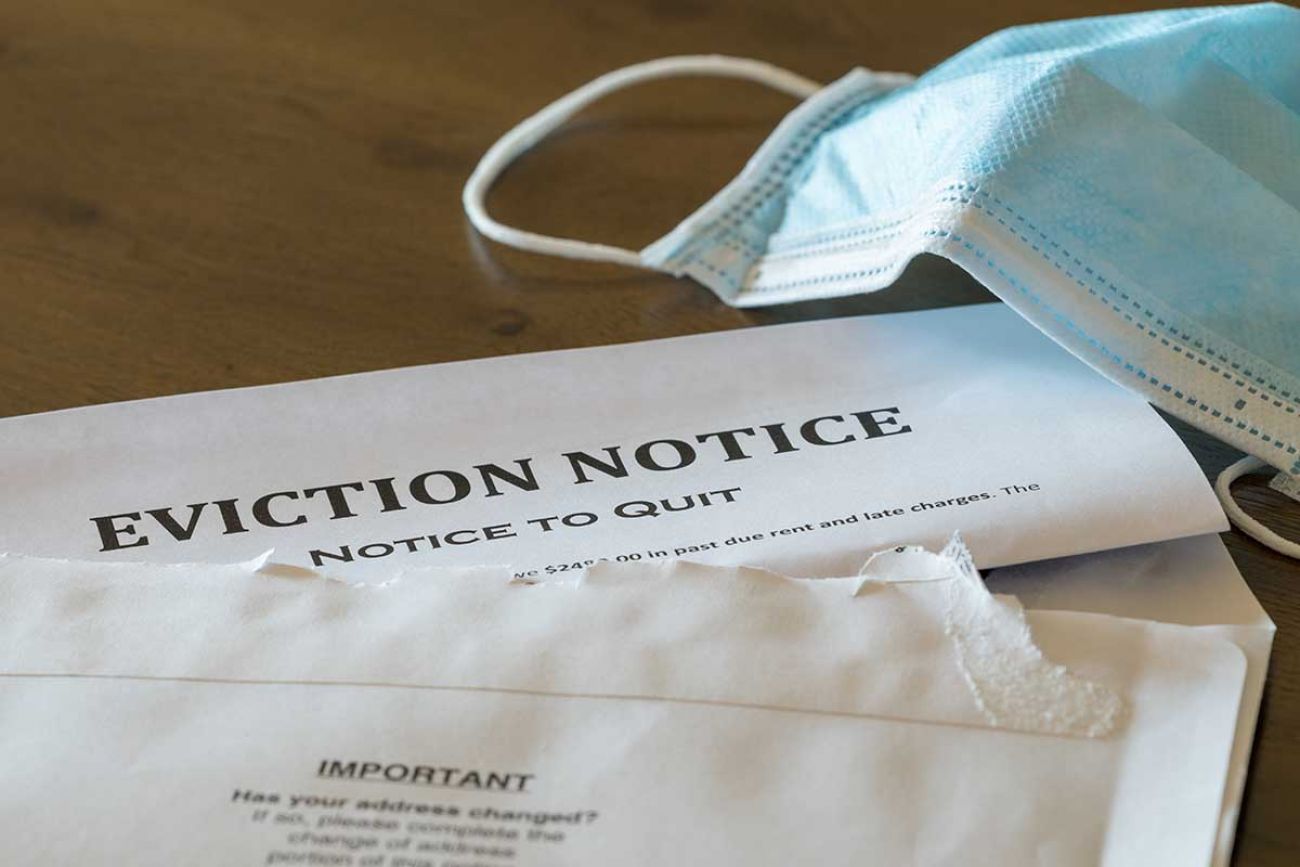Michigan renters may face eviction after high court nixes COVID moratorium

LANSING—Thousands of Michigan residents struggling to pay rent during the ongoing COVID-19 pandemic could face eviction in coming weeks after the U.S. Supreme Court sided with landlords and struck down a federal moratorium.
Housing advocates on Friday said it is difficult to predict exactly how many residents will be evicted next month or beyond, but they are urging the state to offer additional tenant protections, beyond rental assistance and special court rules that will remain in place.
A handful of states, including California, Maryland and New Jersey, have their own eviction moratoriums still on the books. In Minnesota, lawmakers crafted a bipartisan “off ramp” plan that will gradually phase out their state-level moratorium by June 2022.
Related:
- Northern Michigan resort town confronts shortage of year-round housing
- With far fewer houses, Michigan's real estate market is 'absolutely crazy'
- 5 things to know about buying a house in Michigan in real estate 'crisis'
Thursday’s U.S. Supreme Court ruling does not prohibit Gov. Gretchen Whitmer or the Michigan Legislature from considering a moratorium of their own, and “it’d be great” if they did so, said Jim Schaafsma, a housing attorney for the Ypsilanti-based Michigan Poverty Law Program.
Absent state action, ending the federal moratorium will “have a really negative impact on a lot of tenants and their families,” Schaafsma told Bridge Michigan. “So it’s really worrisome to me, because we already know that there’s a substantial number of tenants who are having trouble paying their rent.”
Whitmer, a Democrat who ordered a state-level eviction moratorium early in the pandemic, has given no indication she plans to do so again. Asked about the possibility Friday, her office did not directly answer the question, instead noting the governor has proposed spending $152 million in federal COVID-19 relief funding to create 2,000 new affordable rental homes.
“We look forward to working with the legislature to put Michigan families first by ensuring that everyone has access to safe, affordable housing,” said Whitmer spokesperson Bobby Leddy.
The end of the federal eviction moratorium could have “horrific” consequences for low-income Michiganders still struggling to pay their bills amid the pandemic, said Ted Phillips, executive director of the United Community House Coalition, a nonprofit housing advocacy group for low-income residents in Detroit.
Under state court rules, tenants who already face eviction judgments that have not yet been finalized will now have 10 business days to pay their back rent or lose their home. That means evictions will likely resume early next month after Labor Day.
In the city of Detroit, as many as 650 families with pending court judgments could be evicted in “very short order,” said Phillips. “Evictions are always horrific, even before COVID. Imagine losing every single possession that you have. That’s horrific, and it’s costly.”
There are also as many as 10,000 Michiganders who fought eviction notices this year but could see landlords challenge them again now that the moratorium has lifted, Phillips said.
“I’m not saying that 10,000 people are going to get evicted,” he told Bridge Michigan. “What I’m saying is there are that many (eviction notices) that have been filed, and we don't know how many of them are in a situation where those landlords can now rush in and ask for an order of eviction.”
Some tenant protections remain in place
The federal eviction moratorium was one of three eviction protections for Michigan tenants, and the two others remain in place: A federal-rental assistance program, and state court rules that delay eviction proceedings for tenants applying for those funds.
Combined, the pandemic-era programs have helped sharply reduce evictions: Michigan courts approved more than 41,000 evictions in 2019, but just 13,450 in 2020 and 6,888 so far in 2021, according to the State Court Administrative Office.
Yet as of early August, an estimated 103,456 Michigan households with strained finances faced potential eviction or foreclosure in the next two months, the 16th highest number in the country, according to the U.S. Census Bureau’s Household Pulse Survey.
The rental-assistance program has been “very helpful” for tenants, Shaafsma said.
There have been processing delays in some areas, and that “can be frustrating to all parties involved in the process — from landlord to courts to tenants to communities — but I think it’s getting better and better,” he said.
More than 67,000 Michigan households have applied for the rental-assistance program since March, and about 25,000 applications have been approved so far, while 7,437 have been rejected, according to state data.
The federal government gave Michigan $622 million for the rental assistance program, and the state has so far handed out $152 million of that, with another $20 million set to go out soon, according to the Michigan State Housing Development Authority.
Despite a slow start in distributing the funds, the program has ramped up each month, and the state expects to provide up to $50 million in rental assistance this month and up to $65 million in September, MSHDA spokesperson Katie Bach said.
“We understand this latest court decision may be scary for households that have been relying on the moratorium for protection from eviction,” she said of the Supreme Court ruling.
“That’s why we’ve been encouraging folks that the best way to avoid eviction is to apply for the (rental-assistance) program to get caught up on rental arrears as soon as possible,” Bach said in an email. “It can help pay back rent and future rent and help with utilities to help restore housing stability – something the moratorium was not able to do.”
Residents struggling to pay their rent can apply for assistance on the state website, which also includes contact information for local service providers who can help with the application.
Nearly a third of all Michigan applicants to the rental-assistance program live in Wayne County. But only 24 percent of the county’s 25,000 applications have been processed to date, far shy of the 48 percent statewide average.
The assistance process has been particularly slow in areas like Detroit because of the large volume of applications and federal rules that can hold back landlord payments if the property they are renting is in need of significant repair, Schaafsma said.
“There's a good policy basis for it to ensure that these dollars are being spent on housing that is in decent shape, but it has probably slowed down the process a bit in the city of Detroit,” he said.
To speed up the pace, Bach said the state is now using “high-performing service providers” from the Upper Peninsula to help applicants in other areas with a high volume of applicants. And President Joe Biden’s administration this week created new rules allowing applicants to “self attest” their eligibility rather than document income and hardships.
“We believe this will help accelerate processing times,” Bach said. “...We understand the urgency has increased with the court’s decision and remain committed to efficiently getting emergency rent relief into the hands of every eligible Michigan renter or landlord who needs it.”
‘Irreparable harm’ for landlords
In striking down the federal moratorium, the Supreme Court ruled the U.S. Centers for Disease Control and Prevention order extending the moratorium had, without Congressional authority, intruded on a realm that is generally a matter of state law: The landlord-tenant relationship.
The moratorium had put “millions of landlords across the country at risk of irreparable harm by depriving them of rent payments with no guarantee of eventual recovery,” the court said in an unsigned opinion, with the court’s three liberal justices dissenting.
Brian Westrin, general counsel for the Michigan Realtors association, said he was “pleased with the decision” and thinks Michigan is now taking the right approach by focusing on “meaningful assistance” rather than mandates.
A moratorium is “sort of like a stop gap,” he said, “and I think ultimately making sure that landlords and tenants both have recourse and the necessary resources at their disposal during this very difficult and complicated time is where our priority would be.”
The Supreme Court ruling will not have a major impact on a Michigan Supreme Court administrative order that created special rules for landlords and tenants during the pandemic, according to court spokesperson John Nevin.
A key provision of that order, which remains in effect, requires local courts to suspend eviction proceedings for up to 45 days if a tenant applies for federal rental assistance and is awaiting those funds.
It’s a “pioneering reform” that “is saving lives and helping to resolve cases, getting landlords paid and keeping families safe in their homes,” Nevin said.
Applicants in roughly 80 percent of all Michigan counties have been able to access federal rental-assistance dollars within that 45-day window, Nevin said. And in areas where processing times are slower, “cases are being prioritized to get assistance faster.”
While those remaining protections are helpful, the ongoing pandemic poses unique challenges for residents who may now again face eviction, said Phillips, executive director of the Detroit housing advocacy group.
Renters are commonly evicted for allowing “unauthorized guests” to live with them, and those unauthorized guests are often family members who have recently been evicted themselves, Phillips said.
“Now overlap that with the potential for somebody moving in who might have COVID or might expose seniors to COVID and you’ve got a whole different thing,” he said. “There’s so many aspects to it that are so disturbing.”
The United Community Housing Coalition is one of two groups in Detroit working with the state to distribute federal rental-assistance funding to residents facing potential eviction.
There were delays for some residents early on, but the program has improved and “people are getting paid,” Phillips said.
“In a weird way, the moratorium benefited both parties,” Phillips argued. “We’re averaging over $8,000 per payout with landlords, so it was really to the benefit of the landlords to accept that rather than evict tenants and find themselves eating that $8,000.”
See what new members are saying about why they donated to Bridge Michigan:
- “In order for this information to be accurate and unbiased it must be underwritten by its readers, not by special interests.” - Larry S.
- “Not many other media sources report on the topics Bridge does.” - Susan B.
- “Your journalism is outstanding and rare these days.” - Mark S.
If you want to ensure the future of nonpartisan, nonprofit Michigan journalism, please become a member today. You, too, will be asked why you donated and maybe we'll feature your quote next time!




